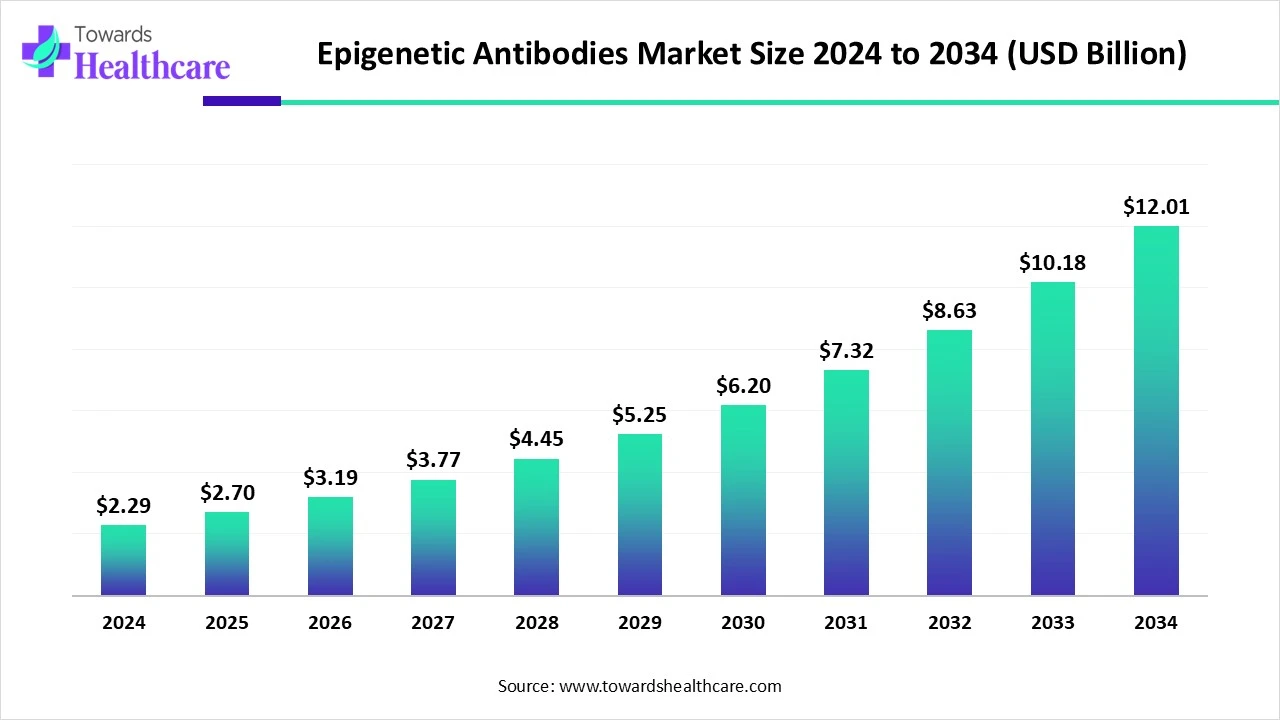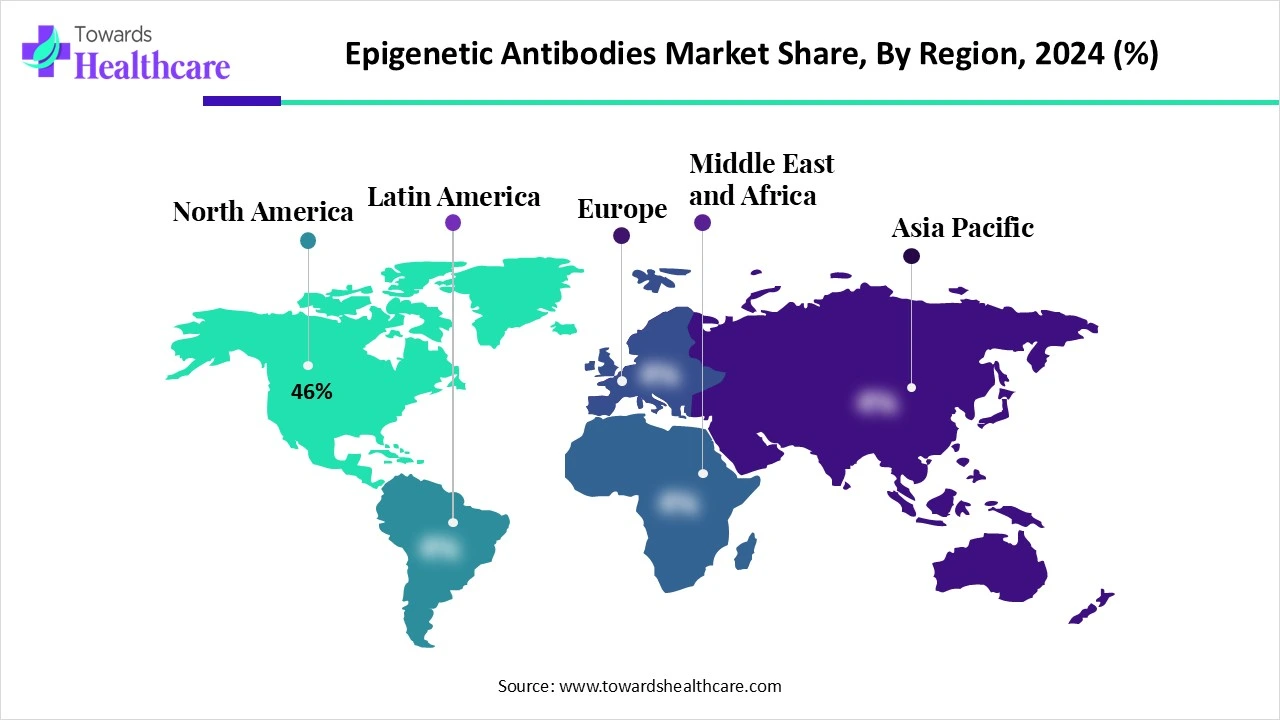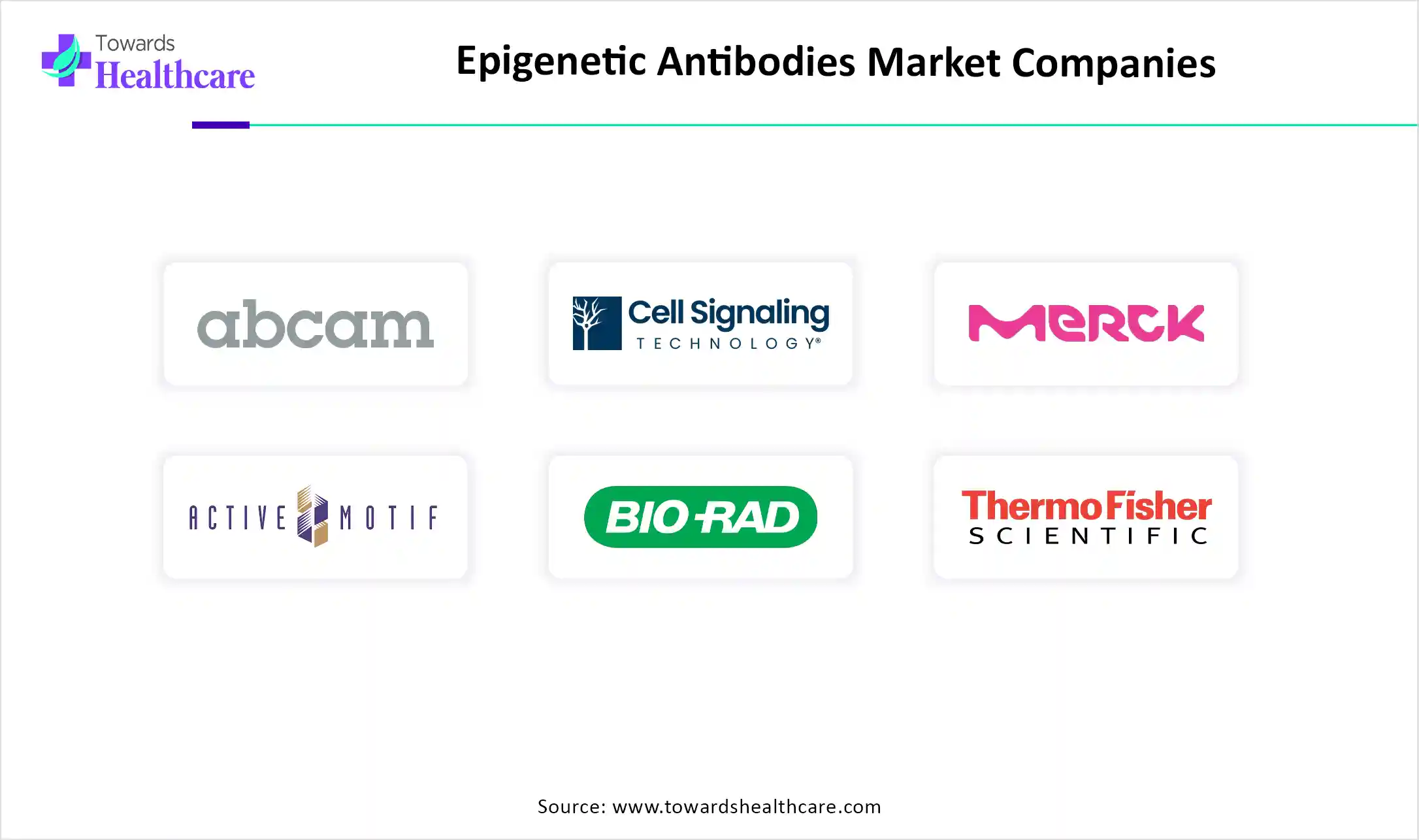February 2026

The global epigenetic antibodies market size is calculated at US$ 2.29 in 2024, grew to US$ 2.7 billion in 2025, and is projected to reach around US$ 12.01 billion by 2034. The market is projected to expand at a CAGR of 18.04% between 2025 and 2034.
The Epigenetic Antibodies Market is expanding due to the growing prevalence of chronic diseases and cancer, increasing research and development in epigenetics studies, and increasing demand for precision medicine. North America is dominated in the market due to advancements in technology like multiomics integration, ChIP-seq, and single cell analysis, while Asia Pacific is the fastest growing a strong presence of major key players and increasing collaboration among academia and biotech firms.

| Metric | Details |
| Market Size in 2025 | USD 2.7 Billion |
| Projected Market Size in 2034 | USD 12.01 Billion |
| CAGR (2025 - 2034) | 18.04% |
| Leading Region | North America share by 46% |
| Market Segmentation | By Target Type, By Antibody Type, By Application, By End User, By Technology Platform, By Region |
| Top Key Players | Abcam plc, Cell Signaling Technology, Inc., Merck KGaA (MilliporeSigma), Active Motif, Inc., Bio-Rad Laboratories, Inc., Thermo Fisher Scientific Inc., Santa Cruz Biotechnology, Inc., Diagenode S.A. (Hologic Inc.), Novus Biologicals (Bio-Techne), Rockland Immunochemicals Inc., EpiGentek Group Inc., GenScript Biotech Corporation, Origene Technologies, Inc., Proteintech Group, Inc., New England Biolabs, Inc., Sino Biological Inc., Bethyl Laboratories (Fortis Life Sciences), R&D Systems (Bio-Techne), Atlas Antibodies AB, Thermo Fisher’s Invitrogen Antibody Portfolio |
The epigenetic antibodies market comprises monoclonal and polyclonal antibodies used to detect and study epigenetic modifications such as DNA methylation, histone modifications (acetylation, methylation, phosphorylation, ubiquitination), and chromatin remodeling. These antibodies are critical tools in epigenetics research, drug discovery, diagnostics, and chromatin immunoprecipitation (ChIP) assays. As epigenetic regulation becomes increasingly linked to cancer, neurological disorders, autoimmune diseases, and rare genetic conditions, the demand for high-specificity antibodies has surged. The market is driven by growth in personalized medicine, biomarker development, and increasing adoption of ChIP-Seq and CUT&RUN technologies.
AI Integration in the optic nerve atrophy (ONA) treatment is driving the growth of the market as AI, predominantly ML allied to epigenomics, is used to identify or classify numerous disorders such as cancer, cerebral palsy, and neurodevelopmental syndromes. AI-driven epigenetic diagnostics allow earlier detection, more efficient treatments, and enhanced patient results. AI-driven technology allows the prediction and design of antibody sequences, epitopes, paratopes, complementarity-determining regions (CDRs), 3D structures, and antigen-antibody interactions. These AI-driven innovations address old trials in antibody development, expressively enhancing specificity, speed, and accuracy in therapeutic design. By integrating computational advancements along with biomedical applications, AI is driving next-generation cancer therapies, renovating precision medicine.
How can Epigenetics be Used to Treat Cancer?
Epigenetic therapy in personalized precision medicine focuses on detecting cancer biomarkers to enhance risk assessment, diagnosis, and targeted treatments. Accelerating technological advances have facilitated the analysis of molecular epigenetic changes linked to cancers, boosting research and development of epigenetic drugs. Key mechanisms include DNA methylation, histone acetylation, and miRNAs, which play roles in cancer biology. The regulation of tumor-related gene expression through epigenetic processes drives the expanding market for epigenetic antibodies.
Major Challenges of Epigenetics
Epigenetics is sometimes incorrectly seen as a single mechanism for transmitting human health risks across generations. These misunderstandings often echo longstanding misconceptions in genetic science and ethics, which can hinder the development of the epigenetic antibodies market.
Multiomics Integration in Epigenetics Antibodies.
Multiomics research is a transformative approach in biological sciences that combines data from genomics, transcriptomics, proteomics, metabolomics, and other omics technologies to gain a comprehensive understanding of biological systems. The integration of multi-omics and AI has emphasized the vital role of epigenetic mechanisms in cancer, opening new avenues for identifying tumor epigenetic biomarkers useful for early screening, diagnosis, and personalized treatments. The development of epigenetic mechanisms, profiling methods, and multi-omics integration techniques can offer in-depth biological insights in animal genetic studies, thereby creating opportunities in the epigenetic antibodies market.
By target type, the histone modifications antibodies segment dominated in the epigenetic antibodies market in 2024, as histone modification antibodies are applied to examine epigenetic modifications to histones, for example, acetylation, methylation, and phosphorylation. It is also used to research chromatin remodelling and epigenetic gene regulation, which occurs as a result of histone acetylation. It serves in various biological processes like transcriptional activation/inactivation, DNA damage/repair, and chromosome packaging. They produce more reproducible outcomes than polyclonal antibodies and are less likely to cross-react with different proteins.
On the other hand, the transcription factor-linked epigenetic regulators segment is expected to grow at the fastest CAGR over the forecast period, 2025 to 2035, as it acts downstream or in recital with signalling molecules, creates and maintains stable cellular identities by driving cell type-specific gene expression programs. It regulates gene expression at different levels, including transcriptional control, chromatin remodeling, and post-translational processing.
By antibody type, the monoclonal antibodies segment dominated in the Epigenetic Antibodies Market in 2024, as these antibodies are used to make drugs that are more successful at treating some diseases, like some types of cancers. It provides many advantages of such as a treatment that is more precise than other treatments. Their ease of production, specificity, and conjugation, and usually low toxicity, make them beneficial in comparison to small molecules.
On the other hand, the recombinant antibodies segment is expected to grow at the fastest CAGR over the forecast period, 2025 to 2035, as it offers advantages such as rapid production and high quality. Because of the in vitro method, the manufacture is easily scalable and takes place without animals. Since recombinant technology allows antibody engineering using molecular biology methods, the resulting antibodies have greater sensitivity and are extremely specific compared to monoclonal antibodies resulting from immunized animals. Different life-science and medicine-related sectors have a strong need for high-quality recombinant antibodies from biotechnology organizations that produce and develop innovative products.
By drug type, the ChIP & ChIP-Seq segment dominated the epigenetic antibodies market in 2024, as this technology allows resolution at the single base pair level, fewer artifacts, enhanced coverage, and a larger dynamic range. ChIP-seq creates a more precise list of protein binding spots and targets of transcription factors, enhancers, and identification of sequence motifs.
On the other hand, the CUT&RUN/CUT & tag assays segment is expected to grow at the fastest CAGR over the forecast period, 2025 to 2035, as it necessitates minimum inputs as few as 100 cells with lower background, advanced signal-to-noise, superior repeatability, and is a shorter process. An easy workflow, with fewer sequencing expenses. CUT&Tag exactly localizes transcription factor binding sites and histone modification regions on the genome.
By end user, the academic & research institutes segment dominated in the epigenetic antibodies market in 2024, as it is used in biomedical and fundamental research, applied to identify and quantify proteins, contribute to knowledge of disease mechanisms, and legalize drug targets. Epigenetic antibodies are quickly expanding in biochemical and biological research and are rapidly growing in novel therapeutic areas. It shows the potential of epigenetic biomarkers to offer valuable data related to disease diagnosis, prognosis, and treatment monitoring.
On the other hand, the pharmaceutical & biotechnology companies segment is expected to grow at the fastest CAGR over the forecast period, 2025 to 2035, as epigenetic biomarkers are becoming significant tools for disease monitoring, diagnostics, and drug response estimation. These biomarkers support to detection of cancer at early stages, monitoring the effectiveness of treatment, and identifying people at risk for different conditions. Epigenetic biomarkers are robust, routinely affordable, easy to use, and precise in order to offer better information for patient prognosis, diagnosis, stratification, prediction of future disease development, and treatment response monitoring.
By technology platform, the manual immunoassay platforms segment dominated in the epigenetic antibodies market in 2024, as manual immunoassay is a finding technology that measures the presence or concentration of an analyte in biological liquid, generally blood or urine, based on the principle of precise combination of antigen and antibody. Implement immunoassay automation to obtain major benefits like easily expanding their offering, growing capacity and productivity, and improving results.
On the other hand, the NGS-integrated platforms segment is expected to grow at the fastest CAGR over the forecast period, 2025 to 2035, as investigators are shifting to NGS to expand the scale and detection power of their genomics studies. The flexibility of NGS platforms has prolonged the scope of genomics research, enabling studies on rare genetic diseases, microbiome analysis, cancer genomics, population genetics, and infectious diseases. NGS has allowed the development of precision medicine approaches, targeted therapies, and enhanced diagnostic methods.

North America dominated the epigenetic antibodies market share by 46% in 2024, as increasing epigenetic research is quickly increasing with the discovery of novel epigenetic markers and the growing use of deep-sequencing methods and cell-type-specific research. The government capitalising on state-of-the-art research facilities is significant for supporting innovative research and staying competitive in the worldwide scientific landscape. The growing prevalence of cancer in the US, with more than 39 million new cancer cases and deaths, is driving an enhanced demand for epigenetic antibodies due to their widespread application in neurodegenerative and oncology diseases.
In the U.S., growing chronic diseases are an important cause of disability, illness, and death, which is increasing the demand for therapeutic and diagnostic epigenetic antibodies. Increasing government and private funding in epigenetic drug discovery and development, like the Cancer Genome Atlas Program (TCGA), a landmark cancer genomics program, has molecularly characterized over 20,000 primary cancer and matched samples spanning 33 cancer types. In 2023, the U.S. increased healthcare spending, 7.5 %, reaching $4.9 trillion or $14,570 per person, which contributes to the growth of the market.
Canadian biopharma and biotech companies are exploiting increased government spending stimulated by the current pandemic to strengthen domestic abilities and foster multinational partnerships that improve drug discovery and development globally. The enhancing role of regulatory bodies is to protect healthcare customers from health challenges, offer a safe working environment for medical professionals.
Asia Pacific is estimated to host the fastest-growing market during the forecast period, as growing medical infrastructure in developing APAC economies and low expenses of epigenetic consumables. Epigenetics is a quickly increasing area of science that focuses on the processes that assist in determining when separate genes are turned on or off. Asia is becoming a manufacturing powerhouse, building on its success in scientific trials and biotechnology innovations. The support of the local government and investment is significant in driving the growth of the biopharma sector in Asia Pacific.
China’s research and innovation strength in biotechnology is gaining of its domestic demand in chemicals, healthcare, and energy, driving the growth of the market. Healthcare of China is a dynamic and booming biotech ecosystem. China is attracting noteworthy investment and partnerships from multinational medicinal companies. China's aging population and rising middle class will consistently drive strong demand for wellness and healthcare services.
India's medical innovation ecosystem is advancing momentum through increased biopharma funding, partnerships, which drive the growth of the market. India's medical landscape is experiencing a digital transformation, driven by policy reforms, government initiatives, and technological advancements, which is causing the growth of the market.
Europe is expected to grow significantly in the market during the forecast period, as Europe is facing considerable challenges in continuing to deliver high-quality healthcare services to its citizens, which drives the growth of the market. Europe is attractive for its ground-breaking healthcare technology research ecosystem, its well-organized and accessible healthcare systems, and its growing efforts towards value-based healthcare.
The increase in personalised medicine is transforming healthcare, instigating a re-evaluation of traditional drug trials in Germany, so a growing demand for target-specific epigenetic antibodies to support customized diagnostics and therapies. Considerable government support in R&D for life science and genomics. Increasing government-driven programmes like Horizon Europe support the growth of the market.
The UK’s government-sponsored local healthcare system is the National Health Service (NHS). The NHS consists of a series of publicly funded medical systems in the UK. UK companies are innovation leaders in all aspects of healthcare infrastructure, from financing, modelling, and design. The United Kingdom's (UK) sophisticated and large healthcare system has an increased need for novel and innovative technology, which causes growth in the market.

On May 13, 2025, Roland Green, Ph.D., CEO and Chairman of Invenra, Stated, “Invenra launched the T-Body Trispecific platform to advance next-generation therapeutic antibodies. Trispecific antibodies represent a major leap forward in therapeutic design, and our T-Body platform offers a unique approach to unlock their potential.” (Source - Businesswire)
By Target Type
By Antibody Type
By Application
By End User
By Technology Platform
By Region
February 2026
November 2025
November 2025
November 2025
